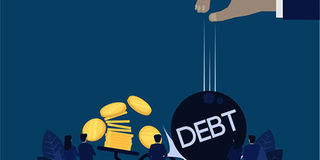Breaking News: Ruto postpones school reopening indefinitely due to flooding
Economic sustainability shapes path to national development

As of June, national debt was at Sh5.89 trillion, which is 60 per cent of gross domestic product. ILLUSTRATION | NATION MEDIA GROUP
What you need to know:
- Comparing debt to GDP is not a good way of determining its sustainability because it fails to reflect the real debt burden.
- As development programmes become more successful, they generate more wealth in the country. This allows us to service debts and become more prosperous overall.
The National Treasury recently expressed its support for the raising of the debt limit by Parliament to Sh9.1 trillion.
Critics immediately jumped on the announcement, attacking it for allowing the government to continue borrowing from foreign banks and governments. They worry that it will plunge us into deeper debt and that the Treasury will not be held accountable.
While these are important issues to be concerned about as a responsible citizen, the issue needs to be unpacked and better understood.
The President and his advisers at the Treasury are attempting to boost the economy through sustainable borrowing — not to burden us with debt.
Like most people discussing the debt limit, I am a concerned citizen. However, many of the armchair economists are familiar with basic tenets of economics but fail to effectively apply those concepts to different countries.
Kenya, which has a market-based economy with less powerful State enterprises, is generally classified as a low-income economy on the cusp of becoming middle income.
This is based on several factors, including gross domestic product (GDP), purchasing power parity (PPP) and poverty levels.
ECONOMIC GROWTH
According to the World Bank, the economy is set to grow by about six per cent in 2020. A normal economy of a wealthy country should grow at about three per cent.
Most lower-income countries, if their development trajectory looks bright, should grow at about twice that — like Kenya.
But economic growth is not the natural outcome of any low-income country. It is the product of the leadership’s hard work, healthy regulation and prudent financial stewardship.
Economic growth is contingent upon being able to borrow money and invest it. An economy with little or no foreign money inflow, such as North Korea, can’t simply generate income off the cash they have.
And a country like Kenya, which is experiencing fantastic growth in terms of telecommunications, internet connectivity and infrastructure, must borrow to make that happen. These investments allow us to become wealthier and pay back debts.
Acting Treasury Cabinet Secretary Ukur Yattani explained the move to journalists recently.
NATIONAL DEBT
As it is, the government comfortably meets its debt obligations. The goal of raising the debt limit is to get rid of a requirement that public debt not exceed half of the GDP.
The debt-to-GDP comparison is heavily criticised by economists — including the Institute of Economic Affairs (IEA), a Nairobi-based think tank that works on public policy.
Comparing debt to GDP is not a good way of determining its sustainability because it fails to reflect the real debt burden.
A better measurement is the debt-to-service ratio — checking whether the economy can repay it based on how much it has serviced over a period. And we are doing a good job at that.
As of June, national debt was at Sh5.89 trillion, which is 60 per cent of GDP. The World Bank and IMF posit that debt ceases to be unsustainable if it reaches the 74 per cent mark, and we are well under that.
PROSPERITY
The new debt limit would thereby enable Kenya to borrow from bilateral and multilateral organisations, which allows us to finance development programmes.
Many aspects of the ‘Big Four Agenda’, such as health research and prevention programmes, are financed internationally.
As development programmes become more successful, they generate more wealth in the country. This allows us to service debts and become more prosperous overall.
For example, the planned building of the industrial park in Kisumu, wind and alternative energy farms nationwide, the Lapsset corridor and the revamping of the Mombasa port are costly projects to set up but will be worth it manifold in future.
If our national consciousness is permeated with doubt and suspicion about every new government move, then our future will become like a self-fulfilling prophecy destined to fail.
While it is wise to be sceptical, a little faith and patience can take us a long way.
Mr Kwinga is a political scientist. [email protected]





